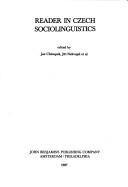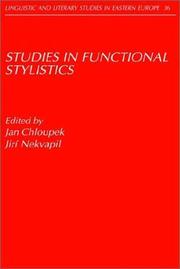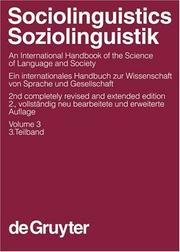| Listing 1 - 7 of 7 |
Sort by
|

ISBN: 9027215286 9786613328427 1283328429 902727892X 9789027215284 9789027278920 9781283328425 6613328421 Year: 1987 Volume: 23 Publisher: Amsterdam Philadelphia J. Benjamins Pub. Co.
Abstract | Keywords | Export | Availability | Bookmark
 Loading...
Loading...Choose an application
- Reference Manager
- EndNote
- RefWorks (Direct export to RefWorks)
Although in Czechoslovakia sociolinguistics is not institutionalized, some results and approaches of Czech linguistics appear to be sociolinguistic, and that from the viewpoint of other linguistic and scientific traditions in general. The socio-component' of Czech linguistics took shape as early as between the two world wars in the activity of the Prague Linguistic School, and is influenced in a positive way also by a contemporary philosophico-ideological climate. The contents of the present volume include contributions of prominent Czech linguists, especially research workers from academic an
Sociolinguistics --- Czech language --- Variation --- -Sociolinguistics --- -Language and languages --- Language and languages --- Language and society --- Society and language --- Sociology of language --- Language and culture --- Linguistics --- Sociology --- Integrational linguistics (Oxford school) --- Bohemian language --- Slavic languages, Western --- Social aspects --- Sociological aspects --- Variation. --- Sociolinguistics - Czechoslovakia --- Czech language - Variation

ISBN: 9027215456 9786613328045 1283328046 9027276897 9789027276896 9781283328043 1556192614 9781556192616 9789027215451 Year: 1993 Publisher: Amsterdam Philadelphia J. Benjamins Pub. Co.
Abstract | Keywords | Export | Availability | Bookmark
 Loading...
Loading...Choose an application
- Reference Manager
- EndNote
- RefWorks (Direct export to RefWorks)
The 15 contributions in the present collection can be divided roughly into three groups:(1) Papers directly following up functional stylistics and the theory of language culture, elaborated in the classical period of the Prague Linguistic School.(2) Papers concerning the problems of style in a wider communicative arena. These contributions are closely related to contemporary text linguistics and also deal with problems involving psycholinguistics, sociolinguistics and semiotics.(3) Papers having, at least in some part, a pronounced historiographic character. These contributions reflect the fac
Language and languages --- Czech Language --- Linguostylistics --- Stylistics --- Literary style --- Style.
Book
ISBN: 1501506757 1501506838 Year: 2018 Publisher: Berlin ; Boston : De Gruyter Mouton,
Abstract | Keywords | Export | Availability | Bookmark
 Loading...
Loading...Choose an application
- Reference Manager
- EndNote
- RefWorks (Direct export to RefWorks)
This volume fills an important gap in exploring English in the domains of business and commerce through the prism of sociolinguistics and the sociology of language, as opposed to analyzing business genres or taking a linguodidactic approach. It expands the regional coverage of English in Europe, with several studies based in Central Europe, and also considers contexts which interact with Europe even though they are physically outside of it (Asia, Africa). It addresses English as just one of several languages at play in the ecology of the countries. It focuses not only on the position of languages as declared in documents of various organizations, that is, language policy, but also everyday linguistic practices as observed in business contexts, that is, interactions. The studies are divided into three thematic areas: ideologies and discourses on English in the business sphere, the management of English in business and organizational contexts, and English and other languages on local and international labor markets. It will be of interest to readers concerned with multilingualism in the economic sphere and the workplace and the interplay between macro and micro levels during the management of communication in organizations.
Commercial correspondence. --- English in Europe. --- Language Policy and Planning. --- Language and Economy.

ISBN: 1556192614 Year: 1993 Publisher: Amsterdam Philadelphia J. Benjamins Pub. Co.
Abstract | Keywords | Export | Availability | Bookmark
 Loading...
Loading...Choose an application
- Reference Manager
- EndNote
- RefWorks (Direct export to RefWorks)
Book

ISBN: 1847698379 1283833794 1847698360 9781847698360 9781847698353 1847698352 9781847698346 1847698344 Year: 2012 Volume: 150 Publisher: Bristol Blue Ridge Summit
Abstract | Keywords | Export | Availability | Bookmark
 Loading...
Loading...Choose an application
- Reference Manager
- EndNote
- RefWorks (Direct export to RefWorks)
Too small to be big, but also too big to be really small, medium-sized language communities (MSLCs) face their own challenges in a rapidly globalising world where multilingualism and mobility seem to be eroding the old securities that the monolingual nation states provided. The questions to be answered are numerous: What are the main areas in which the position of these languages is actually threatened? How do these societies manage their diversity (both old and new)? Has state machinery really become as irrelevant in terms of language policy as their portrayals often suggest? This book explores the responses to these and other challenges by seven relatively successful MSLCs, so that their lessons can be applied more generally to other languages striving for long term survival.
Language and languages --- Language planning --- Language policy --- Glottopolitics --- Institutional linguistics --- Language and state --- Languages, National --- Languages, Official --- National languages --- Official languages --- State and language --- Communication policy --- Planned language change --- Sociolinguistics --- Foreign languages --- Languages --- Anthropology --- Communication --- Ethnology --- Information theory --- Meaning (Psychology) --- Philology --- Linguistics --- Variation --- History --- Government policy --- Planning --- Language policy - Europe - History - 21st century --- Language policy - Europe, Central - History - 21st century --- Language policy - Europe, Eastern - History - 21st century --- Language planning - Europe - 21st century --- Language planning - Europe, Central - 21st century --- Language planning - Europe, Eastern - 21st century --- Language and languages - Variation - Europe
Book

ISBN: 9781501506833 Year: 2018 Publisher: Berlin Boston
Abstract | Keywords | Export | Availability | Bookmark
 Loading...
Loading...Choose an application
- Reference Manager
- EndNote
- RefWorks (Direct export to RefWorks)


ISBN: 9783110199871 3110199874 9783110184181 3110184184 Year: 2008 Publisher: Berlin Boston
Abstract | Keywords | Export | Availability | Bookmark
 Loading...
Loading...Choose an application
- Reference Manager
- EndNote
- RefWorks (Direct export to RefWorks)
| Listing 1 - 7 of 7 |
Sort by
|

 Search
Search Feedback
Feedback About UniCat
About UniCat  Help
Help News
News